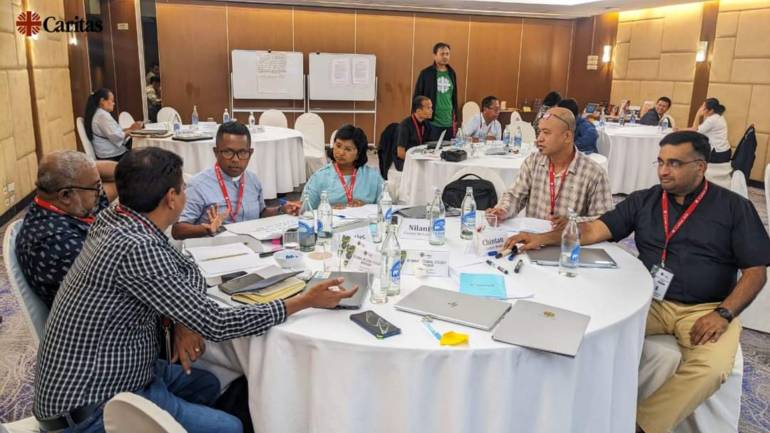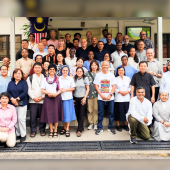Caritas Asia's regional workshop on Integral Ecology: Fostering climate resilience across Asia

Caritas Asia organized a regional workshop on Integral Ecology from July 16-18, bringing together 28 participants from across Asia.
The event highlighted grassroots interventions aimed at promoting climate resilience, aligning with Pope Francis' Encyclical "Laudato Si," which emphasizes the interconnectedness of ecological, social, economic, cultural, and spiritual dimensions.
In her opening remarks, Ms. Mungreiphy Shimray, Regional Coordinator at Caritas Asia, emphasized the spiritual connection between humanity and the environment.
She called for integral ecology, urging participants to recognize the spiritual dimension of our relationship with the environment and each other.
“Integral ecology calls us to recognize, among other things, the spiritual dimension of our relationship with the environment and each other,” said Shimray.
Dr. Benedict Alo D’Rozario, President of Caritas Asia, delivered a compelling keynote address, stressing the urgency of the climate crisis.
“The climate crisis is real and it is the new normal. Dangerous climate change has been happening for a long time,” he noted.
He called for the establishment of climate-resilient communities through Integral Ecology, which includes environmental management, cultural and economic ecology, social ecology, and intergenerational justice.
Dr. Haridas Varikkotil Raman from Caritas India conducted a session highlighting the effects of climate change on smallholder farmers in Asia. He urged the implementation of sustainable practices such as agroecology, water conservation, and waste management, emphasizing the importance of local knowledge and community participation.
Mr. Chintan Manandhar from Caritas Nepal introduced the Smallholder Adaptive Farming & Biodiversity Network (SAFBIN) initiative.
This program aims to empower farmers through participatory rural appraisal, on-farm action research, and farmer field schools. It encourages agricultural practices like seed banking, integrated pest management, and community-managed monitoring.
Ms. Clare Westwood from the Roman Catholic Episcopal Commission for Creation Justice discussed assessing community resilience, presenting examples from various Asian countries.
She introduced a plan to incorporate environmental awareness into religious communities, focusing on the 7Rs: refuse, reduce, reuse, repurpose, recycle, redesign, and regenerate.
Ms. Jing Rey Henderson, representing Caritas Philippines, highlighted the importance of advocacy and communication in promoting Caritas Asia's environmental initiatives.
She emphasized using social media and digital platforms to reach a broader audience and increase awareness and action on environmental issues.
During group discussions, participants addressed pressing issues related to climate resilience development.
Key challenges included insufficient understanding of agroecology, government policies favoring corporate interests, and the lack of subsidies for climate-resilient measures.
Solutions suggested included establishing sub-regional think tanks, facilitating the exchange of best practices, and enhancing collaborations with external organizations.
Caritas Asia is dedicated to assisting its member organizations by enhancing their capabilities in Integral Ecology, formulating action plans, exchanging successful strategies, and offering technical support.
The goal is to establish communities resilient to climate change, embodying the principles of Integral Ecology, and creating a sustainable and just future for all.
The workshop concluded by highlighting Caritas Asia's commitment to addressing climate change and emphasizing the significant contributions of Caritas India.
Caritas Asia and its member organizations are working diligently to create a more resilient and harmonious world by mobilizing communities, fostering ecological consciousness, and promoting sustainable practices.
Radio Veritas Asia (RVA), a media platform of the Catholic Church, aims to share Christ. RVA started in 1969 as a continental Catholic radio station to serve Asian countries in their respective local language, thus earning the tag “the Voice of Asian Christianity.” Responding to the emerging context, RVA embraced media platforms to connect with the global Asian audience via its 21 language websites and various social media platforms.














